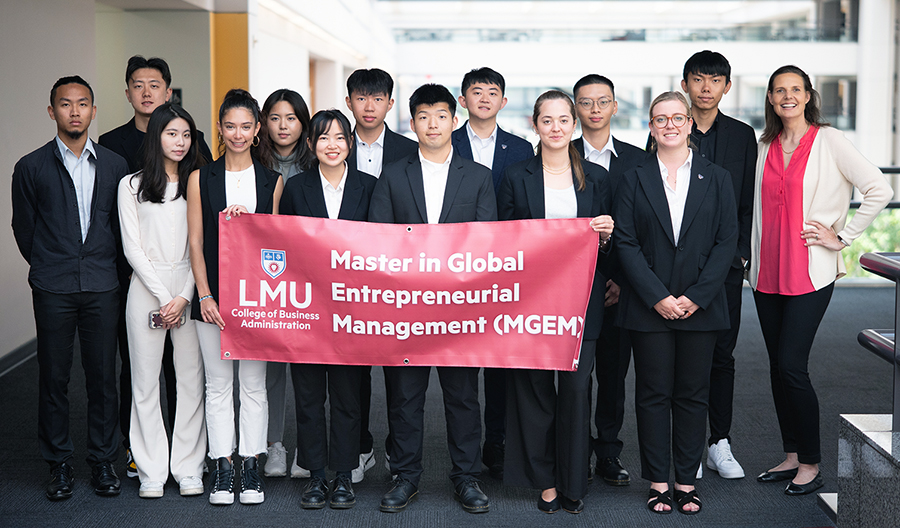
Students in the Joint Master in Global Entrepreneurial Management (MGEM) program had the unique opportunity to partner with a local company on a consulting project during their summer semester at Loyola Marymount University. Each project focused on a problem the clients are facing and trying to solve. This year, students collaborated with Underwood Family Farms, SoleStage and the Los Angeles County Economic Development Corporation.
“The consulting projects are part of an action-based, experiential learning course that involves actual management consulting tasks,” shares Ingrid Greene, MGEM academic program director. “Guided by faculty in the LMU College of Business Administration, student teams act as management consultants to advise executives where they not only gain insights about specific industries and companies, but also contribute valuable suggestions to expand their clients’ businesses.”
To develop solutions for their clients, students critically examined the challenges in question by meeting with their clients and interviewing executives to gain an understanding of the companies and industries. Students also performed a company analysis, conducted industry research, and sought advice from experts. Here is a short summary of the projects and the recommendations the students unveiled during their live presentations on June 23.
Known for years as the “sriracha king” for its distinctly flavored and lucrative pepper crop, Underwood Family Farms business ventures were drastically impacted after losing a key customer. Diversification and innovation were key components of the company’s rebound strategy, including the development and sale of eight different types of hot sauces and BBQ sauces. A team of MGEM students were tasked with developing a marketing strategy for the sauces and recommendations to take the product line to the international market. After conducting research on market size and consumer preferences, the students presented a target consumer profile and recommended marketing strategies to reach target consumers. A key recommendation was reaching consumers on Instagram and TikTok, working with specific social media micro-influencers the team found, and attending a major national hot sauce expo. For the international piece of the project, students recommended three countries to enter based on consumer and food trends.
With stores in New York, Los Angeles, Beijing, Shanghai and Chen Du, SoleStage is a growing retailer offering exclusive sneakers, apparel and accessories that are only available in limited quantities or selected regions. The company would like to launch its own branded sneaker that helps people express themselves through fashion. MGEM students’ market analysis found footwear is the second largest spend category for Gen Z and Millennials. Students also determined consumer purchase criteria and conducted fashion, trend and competitive analyses that guided their recommendation for the sneaker’s design, features, price and distribution. The team’s marketing recommendations for the new sneaker included developing a brand face and storytelling to create deeper connections with the target audience and to highlight the brand using social media, partnering with three specific micro-influencers they identified and doing pop-ups. The team also presented estimated financial forecasts.
The Los Angeles County Economic Development Corporation (LAEDC) is a non-profit organization that champions equitable economic growth across the Los Angeles region through collaboration with community, government, business and education partners to inform and advance its data-driven and evidence-based approach. MGEM students were tasked with developing a foreign direct investment (FDI) strategy for the County of Los Angeles which would help the LAEDC further its goal of helping to bring further investment to the county. To do this, students analyzed which countries have brought the most investment to Los Angeles and discussed what factors contributed to these top rankings. Using public data sources, the team found 23 target countries to research and defined 12 criteria to determine market prioritization metrics including 2021 FDI outflows, risk, ease of doing business, GDP growth, and direct flights/fight time to LAX. After completing their analyses, the students recommended their top countries for the LAEDC to target.
“Working on these consulting projects has been an invaluable experience,” noted Thais Agathe Jeanneney. “It allowed us to apply our knowledge in a real-world setting and make meaningful contributions to the growth of these companies.”
The MGEM consulting projects offered students a unique opportunity to engage in hands-on learning, gain a deeper understanding of different industries, and equipped them with practical skills and experiences that will serve them well in their future careers by preparing them for real-world challenges in the business world. The students showcased their ability to think critically, develop innovative strategies, and contribute to the growth and success of their client companies.
To learn more about the Joint Master in Global Entrepreneurial Management program, visit cba.lmu.edu/mgem.



